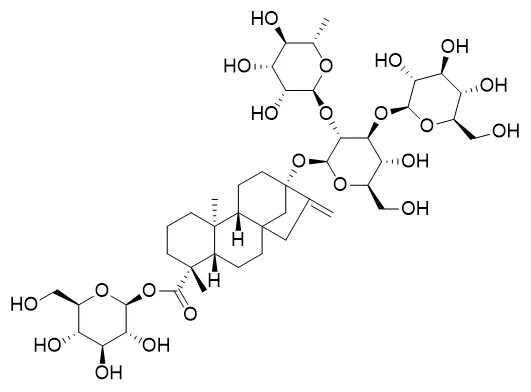| In vitro: |
| Food Chem. 2015 Apr 1;172:1-6. | | Influence of drying method on steviol glycosides and antioxidants in Stevia rebaudiana leaves.[Pubmed: 25442516] |
METHODS AND RESULTS:
The application of different drying conditions (hot air drying at 100 °C and 180 °C, freeze drying and shade drying) on steviol glycosides (stevioside, dulcoside A, rebaudioside A and Rebaudioside C) and antioxidants in Stevia leaves was evaluated. Stevioside, the major glycoside found in fresh leaves (81.2mg/g), suffered an important reduction in all cases, although shade drying was the least aggressive treatment. Considering the antioxidant parameters (total phenols, flavonoids and total antioxidants), the most suitable drying method was hot air at 180 °C, since it substantially increased all of them (76.8 mg gallic acid, 45.1mg catechin and 126 mg Trolox, all equivalent/g Stevia, respectively), with respect to those present in fresh leaves (44.4, 2.5 and 52.9 mg equivalent/g).
CONCLUSIONS:
Therefore, the ideal method for drying Stevia leaves depends on their final use (sweetener or antioxidant), although, hot air at 180 °C is the most recommendable if only one treatment has to be chosen. | | Curr Pharm Des. 2016 Oct 21. | | A Review on the pharmacology and toxicology of steviol glycosides extracted from Stevia rebaudiana.[Pubmed: 27784241] | Stevia rebaudiana Bertoni is a sweet and nutrient-rich plant belonging to the Asteraceae family. Stevia leaves contain steviol glycosides including stevioside, rebaudioside (A to F), steviolbioside, and isosteviol, which are responsible for the plant's sweet taste, and have commercial value all over the world as a sugar substitute in foods, beverages and medicines. Among the various steviol glycosides, stevioside, rebaudioside A and Rebaudioside C are the major metabolites and these compounds are on average 250-300 times sweeter than sucrose. Steviol is the final product of Stevia metabolism. The metabolized components essentially leave the body and there is no accumulation. Beyond their value as sweeteners, Stevia and its glycosdies possess therapeutic effects against several diseases such as cancer, diabetes mellitus, hypertension, inflammation, cystic fibrosis, obesity and tooth decay.
CONCLUSIONS:
Studies have shown that steviol glycosides found in Stevia are not teratogenic, mutagenic or carcinogenic and cause no acute and subacute toxicity. The present review provides a summary on the biological and pharmacological properties of steviol glycosides that might be relevant for the treatment of human diseases. |
|






 Cell. 2018 Jan 11;172(1-2):249-261.e12. doi: 10.1016/j.cell.2017.12.019.IF=36.216(2019)
Cell. 2018 Jan 11;172(1-2):249-261.e12. doi: 10.1016/j.cell.2017.12.019.IF=36.216(2019) Cell Metab. 2020 Mar 3;31(3):534-548.e5. doi: 10.1016/j.cmet.2020.01.002.IF=22.415(2019)
Cell Metab. 2020 Mar 3;31(3):534-548.e5. doi: 10.1016/j.cmet.2020.01.002.IF=22.415(2019) Mol Cell. 2017 Nov 16;68(4):673-685.e6. doi: 10.1016/j.molcel.2017.10.022.IF=14.548(2019)
Mol Cell. 2017 Nov 16;68(4):673-685.e6. doi: 10.1016/j.molcel.2017.10.022.IF=14.548(2019)